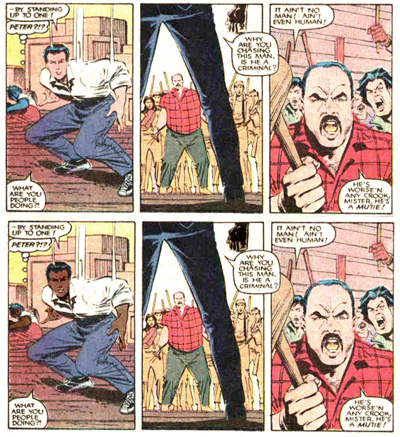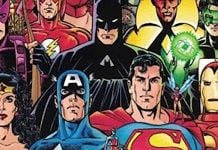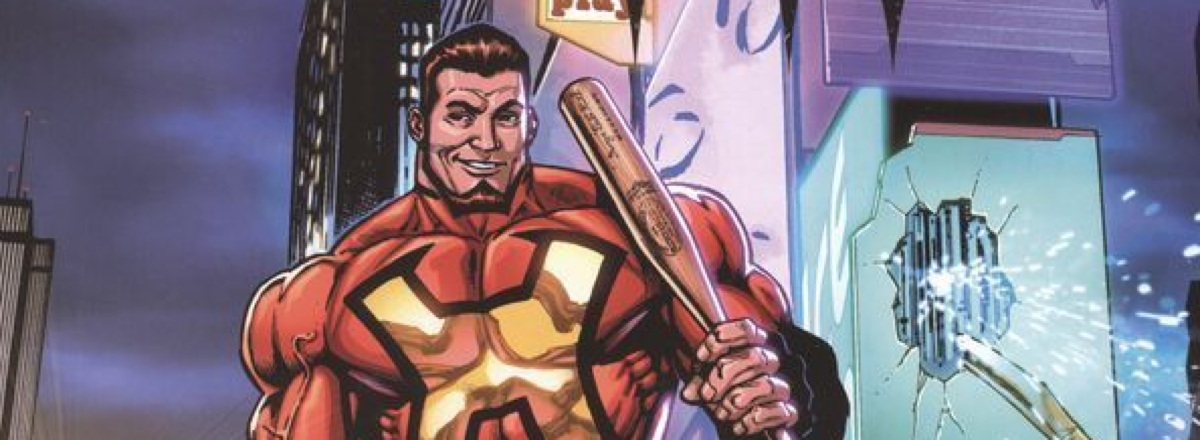Oh man between a new attempt to summit Sandman, and LaBeouf-gate, all hell totally broke loose last night! The hell was rolling around untethered, knocking things down, and it stove a big hole right in the drywall over in the mud room. Damn.
§ Meanwhile, in SoHo, Molly Crabapple went to interview Art Spiegelman and both prevailed despite the threat of weak coffee:
VICE: How does it feel to do a retrospective and see all your work tied up with a bow like that?
Art Spiegelman: It’s dangerous to have a retrospective while you’re alive. I don’t know what I’m doing. I haven’t drawn for a few months, except a thing in The New York Times. I feel as rusty as I can feel. It’s like, Oh good! Now I can get back to the agony of facing a white sheet of paper with no clear idea of what happens on it.
§ Orion Martin asks What If the X-Men Were Black? while examining the oft-repeated analogy between mutanthood and minority struggle:
In the alternate universe where the all mutants are black, many events in the X-Men history become actual social commentary because they are dealing with real dimensions of power. Reading about black teenagers standing up to a largely white mob is different than reading about white teenagers in the same situation. These images show that when the writers of the X-Men do comment on social issues, the meaning of these comments is hampered and distorted by the translations from reality to fantasy and fantasy back to reality.
§ Via twitter, former DC editor Wil Moss confirmed he’s moved a few blocks over to Marvel:
@graemem Thanks, Graeme! Me too. ;)
— Wil Moss (@Wil_Moss) December 17, 2013
Moss made his move a few days before this Friday’s deadline for DC staffers to announce whether they’re moving to Burbank or staying in NYC to continue their east coast lives.
§ Also, former Marvel publisher Bill Jemas has reemerged developing comics for Take-Two the video game company:
Bill Jemas, best known for his eventful stint as Marvel’s president, has a new gig: launching “graphic fiction imprint” at video game publisher Take-Two Interactive Software. While no further details about the imprint have been revealed, there are plenty of high-profile games on the roster of Take-Two, the parent company of both Rockstar Games (Grand Theft Auto, Max Payne) and 2K Games (BioShock, Borderlands). Ruwan Jayatilleke, Marvel’s former associate publisher, joined Take-Two earlier this year.
§ Here’s an excellent piece by John Hogan looking at gag comics and comceptual art via the work of Mark Newgarden and Richard Prince:
The gap in perceived cultural value between conceptual art and gag cartoons cannot be wider. The practices exist at opposite polarities of artistic expression. A conceptual art practice may be entirely immaterial, or manifest as found objects, performances, written propositions, or art objects that critique what it means to be an art object. A gag is nearly always a rectangle with pictures inside it and text beneath it. The image and the text combined make a joke. The one and only purpose of the gag: a laugh. But within this format there are infinite varieties, and the self-reflexivity so characteristic of conceptual art is often found therein.
§Best ofs! Rolling on! Zainab Akhtar concludes her survey of various comics folks who pick notable books of the year, none of which are Hawkeye or Boxers and Saints. It’s a bracing, exciting list.
And more: Tom Callahan
IGN (spoiler, ugh)
and Comics Alliance Part Three and Part Four.
§ Ad finally, The Calgary Herald notes that 2013 yielded bumper crop of graphic novels! Yessir!









What’s with the ign hate
Based on my hasty reading of the excerpt from “What If the X-Men Were Black,” I’m going to say that the piece seems to be backing itself into the position that realistic social commentary is more limited than fantasy social commentary. If the scenes showing the X-Men facing prejudice and violence had been specifically rendered to comment on racism against African Americans, would the series have become such a powerful touchstone for other oppressed groups, including gay and transgender communities? Does the fantasy element allow such scenes to retain their power rather than ossify into the merely historical? (After all, even conservatives seem to have warm and fuzzy feelings about Rosa Parks today, however misguided those feelings might be) In this case, at least, it may be true that fantasy (or, as I prefer to think of it, the metaphorical) allows readers to identify with and repurpose scenes of victimization and oppression with greater depth and flexibility than a more realistic portrayal could have accomplished.
Comments are closed.